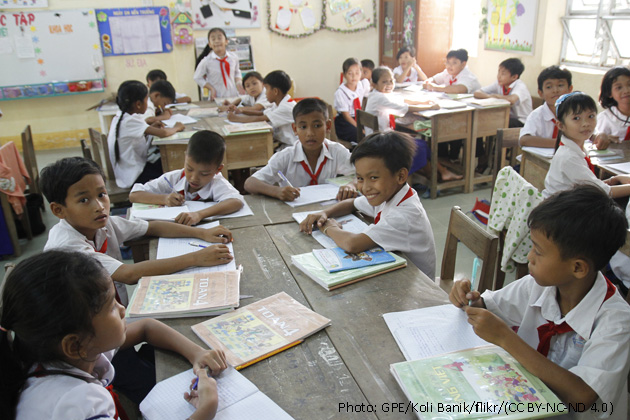This blog was written by Yue-Yi Hwa, RISE Directorate and Blavatnik School of Government, University of Oxford, and Bich-Hang Duong, RISE Vietnam and University of Minnesota. It was originally published on the RISE Programme website on 5 February 2021.
Classroom learning doesn’t happen by magic. As many parents have discovered during COVID-19 school closures, teaching is not a set of straightforward steps. Rather, it is a complex craft.
At RISE, we are keen to demystify the multifaceted, interconnected processes through which education systems can cultivate learning for all children. For many RISE researchers, this means seeking approaches to facilitate children’s mastery of foundational literacy and numeracy. For the RISE Vietnam country research team, this means seeking answers regarding why Vietnam’s education system cultivates student learning levels that are on par with those in much wealthier countries.
In a recent research study, one of us (Bich-Hang), together with Joan DeJaeghere and Vu Dao, explored in depth the teaching practices that support and foster high levels of learning of Vietnamese secondary school students. We analysed video-recorded observations of Math and Literature classrooms, alongside pre- and post-lesson interviews of secondary teachers in 20 schools located in 10 provinces across Vietnam. Based on students’ test results, we grouped these schools into a high-performance group and a low-performance group. We then closely examined teachers’ practices in these schools, highlighting critical components as they consistently emerged in classrooms.
Besides shedding light on some of the teaching and learning processes underlying Vietnam’s educational success, the findings from this study also resonate with RISE research on foundational skills. In particular, these findings strengthen the case against some common—but damaging—fallacies about prioritising foundational skills in education systems.
- Metacognition and active engagement matter
In the study, we found that most of the classrooms with high levels of learning integrated the teaching of metacognitive knowledge and strategies with other aspects of learning. Metacognition—or, simply put, thinking about one’s thinking—includes knowledge about the content of learning and knowledge about oneself, as well as various cognitive and metacognitive strategies to support learning. Much has been documented in the literature regarding the positive relationship between students’ metacognition and their learning performance. In addition, proper teaching of metacognitive knowledge and strategies helps to engage students because it raises the likelihood that they would find learning to be meaningful and interesting.
For example, in a literature class from a high-achieving school in this study, the teacher asked a wide-ranging and carefully planned set of “big and small questions” designed to identify how much her students had learned and to promote their thinking skills. Her lesson, which focused on an essay on the detrimental effects of smoking, included both closed- and open-ended questions, ranging from general to specific, to assess knowledge and support students’ higher-order thinking such as application, analysis, creative, and critical thinking skills. In some situations when the students appeared to be unsure or, alternatively, very sure of the answer, she paraphrased or asked a question in a way that provoked thinking more deeply about the issue under study. This kind of high-level questioning helps students to reflect on their understanding and reasoning and thus, contributes to deep learning and engagement.
Such teaching practices are pivotal because they help learners to engage meaningfully with instructional content and to take ownership over their learning. But they are not just for secondary school students in high-performing Vietnamese classrooms. These practices should be used at all levels of learning, even the most foundational.
Fallacy: Prioritising foundational skills means treating children like robots.
Fact: Prioritising foundational skills should mean giving children well-structured opportunities to independently and meaningfully engage with new knowledge.
We are not denying the unpalatable fact that many classrooms around the world do, in fact, treat children like robots—classrooms where children are expected to reproduce textbook content, with an emphasis on perfect recall rather than deep understanding or emotional engagement i. But such classrooms do children a disservice.
Cognitive science research has shown that extensive practice is fundamental to mastering new skills and knowledge. But it has also shown that the form of practice also matters tremendously. Rote practice, in which content is memorised without any engagement with its meaning, does not facilitate subsequent learning. However, sustained and meaningful practice can lay the groundwork for deeper knowledge, especially when coupled with feedback that supports children’s metacognitive growth.
This distinction between rote learning and meaningful engagement matters even at the most foundational levels. A child could be told to memorise that “c” followed by “o” makes the sound “co” because it’s what they are supposed to memorise today. Alternatively, they could be taught that “c-o” make the sound “co” because one day it will help them to write about how much they love chocolate. The interlinking of deep engagement and of repeated practice is the reason why our preferred term for foundational skills at RISE isn’t just “foundational skills.” but rather “universal, early, conceptual and procedural mastery of foundational skills”, or UECPMFS. (To find out why we also emphasise “universal” and “early”, refer to the UECPMFS Insight Note).
- Prior knowledge lays the ground for new knowledge
Evidence from our study of Vietnamese classrooms also shows that effective teaching of metacognitive strategies involves linking new knowledge to prior knowledge. Teachers taught content knowledge carefully in most classrooms the team observed. But it was evident that teachers in high-performing classrooms provided students with more opportunities to discover new concepts and learn how to connect these with the knowledge they had already acquired, the strategies they had learned, the context where they were located, and their identities and experiences as learners (including exam-takers), readers, and writers.
This reinforces a point that we have made about why foundational skills matter:
Fallacy: Foundational skills are an end in themselves.
Fact: Foundational skills are foundational—they matter because they empower children to access other new knowledge, experiences, and opportunities.
Foundational literacy and numeracy are always a starting point, and should never be the end goal of an education system. These end goals—the knowledge, competencies, dispositions, and values that children cultivate throughout their time in school, in order to prepare them for healthy, constructive adulthoods—can and should vary depending on each child’s inclinations and interests, as well as consensus-based priorities of stakeholders in the education system.
But in the world that we all share today, any education system that doesn’t facilitate children’s mastery of foundational literacy and numeracy is failing these children and severely hampering their opportunities for future learning and flourishing. Critical thinking, creativity, communication, and collaboration have always been important for human flourishing. But in the 21st century, it is more important than ever before for such complex cognitive and socioemotional skills to be complemented with competence in navigating written and quantified information.
To help children build solid foundations that can facilitate increasingly complex learning, instructional components need to be appropriately sequenced. Such developmentally appropriate sequencing cannot be taken for granted. For example, a recent RISE working paper on the alignment of curricula, exams, and instruction in Uganda and Tanzania found, among other things, that phonics, a fundamental area of literacy, was not part of the curriculum standards for the first year of primary school in either country, and did not appear at all in the primary school curricular standards for Uganda.
- Teaching is complex
Another consistent finding of the classroom observations in high-performing Vietnamese schools is effective teaching is holistic. In fact, while pointing to metacognitive teaching as a feature of classrooms with good learning performance, we emphasised that these teaching practices were not discretely enacted towards standalone learning goals. Rather, they were closely integrated with content knowledge teaching and with high levels of teacher-student interaction and emotional engagement.
For example, in one of the classrooms we observed, the teacher used multiple instructional practices to successfully deliver the content knowledge and teach students how to learn by helping them think for themselves and apply various learning strategies. In addition, class video analysis shows that his classes demonstrated an engaging learning climate with close teacher-student relationships. The teacher was able to connect with students emotionally by providing relevant social and emotional support, for example, positive feedback on students’ answers and the use of appropriate, pleasant jokes in instruction. As a result, his math lessons were among the most enjoyable and engaging classrooms that we observed.
This example highlights a final fallacy about teaching, learning and foundational skills:
Fallacy: Teaching is easy, at least when it comes to foundational skills.
Fact: Teaching is always a complex interaction of many elements.
As argued in a RISE Insight Note about aligning levels of instruction with goals and the needs of students (ALIGNS), teachers have to align numerous moving parts—not least their students’ varied interests, moods, and levels of prior knowledge—in order to facilitate children’s learning effectively.
Consequently, teachers need to be provided with high-quality support, including high-quality instructional materials and training that matches their classroom realities. Instructional programmes where local volunteers and uncertified teachers successfully teach children how to read and count are not evidence that teaching is easy. Rather, these programmes (some of which are discussed in the ALIGNS Insight Note) are evidence of the power of developmentally appropriate pedagogical approaches that are delivered via carefully designed instructional materials, highly motivated instructors, and experienced instructional coaches.
A closing thought on classroom research
Understanding the complexity of classroom learning involves an appreciation of the nuances of teaching and learning. As shown in RISE Insight Notes, teaching indeed involves too many factors, processes, and relationships to be fully encapsulated in any single research methodology or academic discipline. Standardised quantitative measures, such as time-on-task, can be useful for revealing large-scale, high-level patterns. But at least as important are the unstructured lesson observations that have the flexibility and granularity to identify the constructive role of a casual joke in facilitating meaningful classroom interactions. Enabling all children to access deep, meaningful learning is a big goal that demands a comprehensive methodological toolkit of education researchers collectively.
Footnotes:
- For an example from ethnographic research in Vietnamese primary schools, see Tanaka, Y. (2020). Education reform in Vietnam: Can learner-centered pedagogy work?[ Cải cách giáo dục Việt Nam: Liệu có thực hiện được “Lấy học sinh làm trung tâm”?]. (Q.V. Nguyen Trans). Hanoi, Vietnam: NXB Phụ Nữ (Original work published 2008).
RISE blog posts reflect the views of the authors and do not necessarily represent the views of the organisation or our funders.





